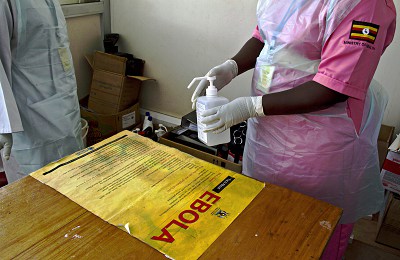 JOHANNESBURG: South African professor Janusz Paweska hesitates for a moment as he describes his work trip to the heart of the Ebola epidemic in Sierra Leone.
JOHANNESBURG: South African professor Janusz Paweska hesitates for a moment as he describes his work trip to the heart of the Ebola epidemic in Sierra Leone.
"Obviously we had to touch the tubes," he says. "I wonder if I should tell you but I opened them with my hands -- I opened 1,400 tubes of blood with my hands."
He used gloves, of course, three pairs of them. But when handling a disease that has so far killed more than 5,000 people in West Africa, according to the World Health Organization, there's a lot of trust put in those gloves.
Paweska heads the special pathogens unit at the National Institute for Communicable Diseases (NICD) in South Africa, one of only two top tier -- level four -- biosafety labs on the continent.
In West Africa, Gabon also has a top-level laboratory able to safely handle highly pathogenic agents such as Ebola, and was instrumental in identifying the recent Ebola outbreak in the Democratic Republic of Congo (DRC).
But it's much smaller and comes without the bulky hazardous material suits Paweska and his Johannesburg colleagues have access to.
Here in South Africa, they experiment on bats, studying how the Ebola virus replicates in the animals' blood and tissues without killing them.
It's the kind of work that could have a real impact in the development of an antiviral drug or vaccine.
And while the Johannesburg laboratory cannot prevent an Ebola outbreak, it can diagnose and recognise one -- an essential skill crucially missing from the very countries currently battling the disease.
- 'Moral responsibility' -
==========================
Now back in Freetown with his team, Paweska has only a field lab where each blood sample is tested, one-by-one. The work is crucial, exhausting, and not without risk.
"It's a huge operation," says Paweska -- the biggest the institute has ever taken on.
Many volunteered, but only about four or five have actually signed up to help in the next six months. Some researchers' families simply refused to let them make the trip.
And there is no extra pay. "It's part of our profession and I think we have a sort of a moral responsibility to help," says Paweska.
"Why has this (current) outbreak actually spread so violently? There was no diagnostic capacity at all and also the surveillance capacity was very low," he says.
South Africa's NICD, on the other hand, has repeatedly identified episodes of deadly haemorrhagic fever -- like Ebola -- including one in Johannesburg in 2008 that killed four people.
The Democratic Republic of Congo doesn't have a top biosafety lab, but has developed the diagnostic capabilities to handle an outbreak over time, with the help of the Johannesburg lab, says Paweska.
In August, the country suffered its seventh Ebola outbreak since 1976, though of a different strain to that circulating in west Africa. Three months later, the WHO declared the DRC Ebola-free.
While many new viruses are emerging in Africa, Paweska says the decision to build a top-level biosafety lab is highly dependent on a country's economic resources.
A level-four lab needs a special ventilation system, a filtration system, sterilisation capabilities, fail-safes to prevent the escape of deadly pathogens, and long-term storage capacity.
"It costs anything between 100 and 150 million dollars, and you have to spent plenty on maintenance -- around 10 to 15 million," he says.
But Africa needs to get its spending priorities right, Nelson Mandela's widow Graca Machel pointed out at a discussion last week on the response of African leaders to the Ebola crisis.
"Either we build a laboratory or we have huge military budgets. To do what? To kill who? To kill ourselves? For the love of God, put things into perspective."
























Comments
Comments are closed.